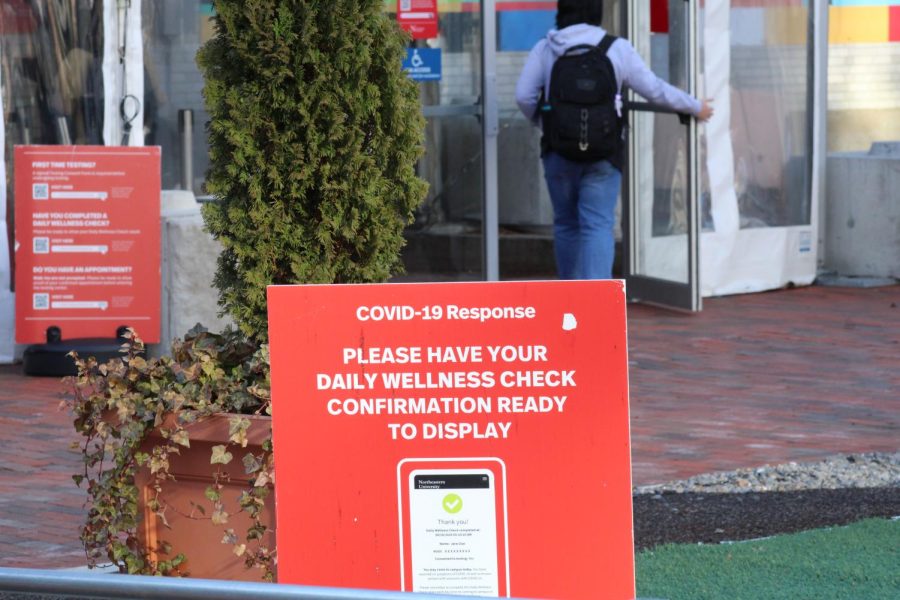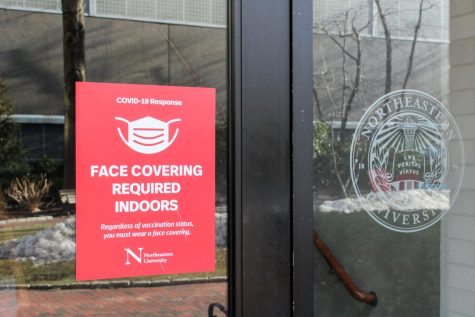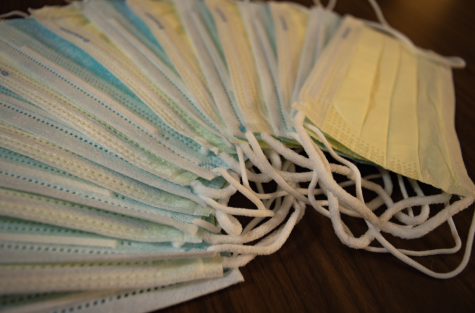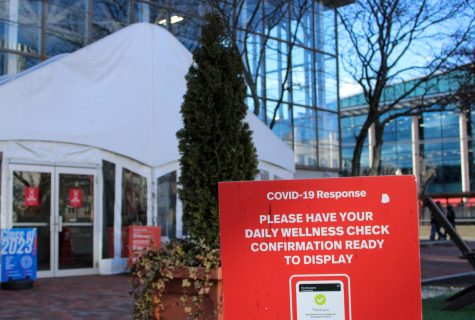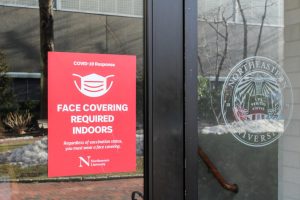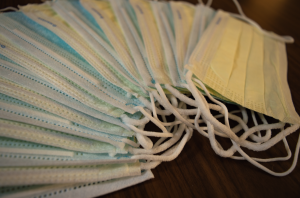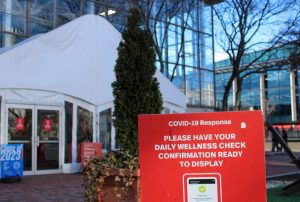Students divided on Northeastern’s move to drop indoor mask mandate
Northeastern announced Tuesday that starting Saturday, masks will no longer be required in most indoor settings on campus. The change came shortly after the city of Boston announced the mask mandate would lift this weekend.
March 4, 2022
Mandatory masks indoors will soon be a thing of the past on Northeastern’s Boston campus.
Starting March 5, masks will only be required in the University Health and Counseling Services building. The change was announced online Tuesday and in an email to students Wednesday morning.
“The university is marking another milestone in its management of COVID-19 as we move to align our mask policy with recent public health guidance,” wrote Chancellor Ken Henderson and Provost David Madigan in the email. “The decision is guided by scientific data and the latest public health guidelines.”
The change came just hours after the city of Boston announced its mask mandate for most indoor settings would be lifting Saturday.
The reaction from students has been mixed. Some on Reddit have expressed excitement that masks will no longer be required. Others wish Northeastern would keep the mask mandate in place longer. Still others think there should be a policy in between, such as requiring masking in certain situations.
For fourth-year computer science major Marley Robinson, the change was expected but still disappointing. She said since Northeastern did away with mandatory testing, it has been clear masking was also coming to an end and that the university was just waiting for Boston to change its guidance.
Robinson is the president of Diversability, a disability advocacy and education group awaiting club approval at Northeastern. She said the sentiment among club members is that the change doesn’t consider those at higher risk.
“In all email announcements about anything related to COVID, they always pivot the story to make it seem like we’re a majority healthy and young community,” Robinson said. “They don’t even really mention any disabled people who are on campus or people who are immunocompromised. It really feels like they’re not considering how it’s impacting us.”
She said she would feel safer on campus if masking and testing were both still required.
Third-year political science and criminal justice combined major Frank Mastroianni was also unsurprised at this week’s announcement and said that for him, the high vaccination rate in Massachusetts and the vaccine mandate on campus are enough to keep him comfortable on campus.
“I think that it makes sense in the direction that the country is moving,” Mastroianni said. “It seems to be in line with pretty much how governors in the Northeast have been moving the country. I think it was a pretty reasonable time. … With the very high vaccination rates in the Northeast and the vaccine mandate at Northeastern I think it was time.”
Northeastern is not the only school to move towards a mask-optional policy in recent weeks. Boston University announced Tuesday that it will no longer require masks in most public spaces, though will continue requiring them in classrooms for the time being. Both the University of Massachusetts Lowell and Emerson College also changed guidelines in February to end indoor mask mandates in some settings.
“I will be honest, I was incredibly sad and frustrated,” said first-year international business major Johanna Murdock. “It genuinely was very tough because, although I’m not personally immunocompromised, I know many people who are — many close friends of mine, many people I care about very deeply and to me to see this almost seems like they’re treating their lives as collateral.”
Both Murdock, who is the vice president of Diversability, and Robinson said they plan to keep masking on campus.
The email from Northeastern administration said the university is “prepared to adapt our campus protocols as needed, keeping the health and wellness of our community at the forefront of our decision making,” and encouraged understanding of other peoples’ comfort levels.
“We understand that people may have different comfort levels when it comes to removing their masks, and we urge everyone to respect the decision of others regarding mask wearing,” the email read.
While some students are fully in one camp on the masking debate, for others it is not so simple. Second-year graduate student in the journalism program Lausky Liu said he’s happy to drop the masks, but isn’t sure what the future holds.
“I feel excited about it because I do have some COVID fatigue, to be honest. But I also have some concerns about what’s gonna happen next, because I don’t think we have enough real world data or figures to tell us what’s going to happen next,” Liu said.
He said he still has some concerns about COVID-19, in part because research has shown that vaccine effectiveness drops, but for now, he is happy to lose the mask.
“Generally I’m still happy to drop off masks,” Liu said. “I will still feel secure to put off my mask because I know Massachusetts is one of the states that has the highest vaccination rate.”
Liu said he will decide if he will wear a mask in the classroom on a class by class basis, informed mostly on the professor’s choice.
Diversability is joining with other student organizations, including NU Mutual Aid, to host a “COVID Town Hall” 7 p.m. Monday on Zoom.
“We just wanted to be able to talk about the reasons we’re concerned about the restrictions going away and also trying to talk about some solutions,” Robinson said. “We understand that Northeastern probably won’t bring back masks or require testing but at least if they were able to bring back NUflex that would be a huge win for students who are disabled because they may actually have an option to feel safe.”
Robinson, who has a form of muscular dystrophy, said she is more nervous about going to classes now that mandated testing and masking are ending.
Before Northeastern had a vaccine mandate and vaccines were widely available, Mastroianni said he supported mask mandates. As a political science and criminal justice combined major, he said the politics and divisiveness behind public health mandates has “laid bare the divisions in the country.”
In my opinion, wearing a mask is such a small, simple thing. Getting tested takes 10 minutes. I feel that maybe people are not fully appreciating how little effort you can put in to achieve some very great results.
— Johanna Murdock
“Basically, when one side says one thing, the other side says the complete opposite thing. It’s really interesting to me, that kind of thought experiment,” Mastroianni said. “The other thing that really has to be stressed is just like the supremacy of the vaccine as the only long term solution.”
Murdock said she hopes those at higher risk of COVID-19 can get some level of understanding from others in the face of changes like these. She said she feels the reaction has been “very hostile towards disabled students” so far and urges people to see disabled and immunocompromised people not just as “collateral” but real people.
“Students should be able to go to class and not be afraid that the person next to them is going to get them very, very sick, possibly to the point where it may be life threatening. Students shouldn’t have to worry about that,” Murdock said. “In my opinion, wearing a mask is such a small, simple thing. Getting tested takes 10 minutes. I feel that maybe people are not fully appreciating how little effort you can put in to achieve some very great results.”


